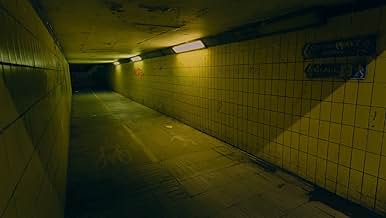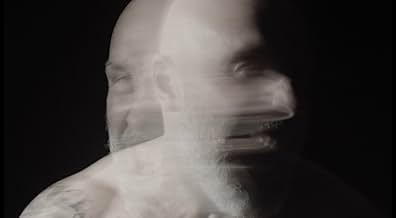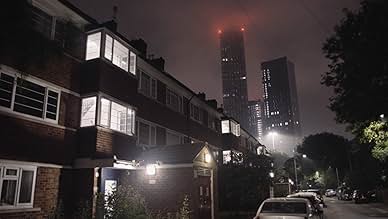Nobody Loves You and You Don't Deserve to Exist
- 2022
- 1h 38min
VALUTAZIONE IMDb
7,4/10
102
LA TUA VALUTAZIONE
Mentre il contagio colpisce l'Inghilterra, e milioni di persone riflettono sulle loro vite, un insegnante di inglese tenta di recuperare frammenti del suo sé in frantumi nelle cattedrali e n... Leggi tuttoMentre il contagio colpisce l'Inghilterra, e milioni di persone riflettono sulle loro vite, un insegnante di inglese tenta di recuperare frammenti del suo sé in frantumi nelle cattedrali e negli anfratti di Manchester.Mentre il contagio colpisce l'Inghilterra, e milioni di persone riflettono sulle loro vite, un insegnante di inglese tenta di recuperare frammenti del suo sé in frantumi nelle cattedrali e negli anfratti di Manchester.
- Regia
- Sceneggiatura
- Star
Recensioni in evidenza
When you look closely at Hieronymus Bosch's works, you'll see a slew of tiny, tucked-away micro-portraits. Religious allusions, eroticized violence, and references to heaven and hell are only some of the elements that made Bosch's art such a bizarre tapestry of sin and transcendence.
Why, you might wonder, am I referring to a 16th-century Dutch artist in the context of a film review? The explanation is simple: 'Nobody Loves You and You Don't Deserve to Exist' is a complicated code of enigmatic imagery that illuminates a link between conservative Britain and the late-medieval currents of heaven and hell.
This bold assertion is reinforced from the outset by a horrific, yet elegantly delicate medieval composition that walks us as the spectator through each micro-portrait of Bosch's "The Garden of Earthly Delights." The storyline of this film is found in the geography of medieval music. Given the prevalence of travel, pilgrimage, exile, peregrinations, and the like throughout this time, "Jack," the working-class jester disturbed by the mind of a tortured saint, is no exception. In a similar vein to Barry Unsworth or Emilio de' Cavalieri's works, the reader is immersed in the life of an outsider, in this case a whole gallery of classic medieval archetypes and relative outsiders in their own right, as they are only revealed to the audience in theatre-like extensive monologues delivered to them directly in a genius blend of performance and interview, I found myself constantly asking who is the interviewer? But, that question is not something that requires a definitive answer.
Information is pieced together through the murmurs of women, most of whom appear to have little moral culpability for Jack, except for the closing speech, which connects with the remorse we feel after the fact, when it's too late to alter anything. This is further kept together by a god-like narrator recounting to us Jack's wonders and woes, along with fantastic gothic imagery scattered with brutalist and increasingly modernist architecture, which appears to move away from purity as the tale proceeds.
To expand on this final point, I take away from this film the harmful and immoral stupidity that has steadily engulfed the now-isolated former United Kingdom. Brett Gregory, the director/writer, also thoughtfully and efficiently adapts each chaotic pane of Bosch's painting into its own narrative act, a challenging feat to do but one that rarely failed to astound me.
In short summary, excellent writing and a fresh plot, with some wonderful characters and a vivid direction, respectfully paying due to the world of art and literature alike.
Why, you might wonder, am I referring to a 16th-century Dutch artist in the context of a film review? The explanation is simple: 'Nobody Loves You and You Don't Deserve to Exist' is a complicated code of enigmatic imagery that illuminates a link between conservative Britain and the late-medieval currents of heaven and hell.
This bold assertion is reinforced from the outset by a horrific, yet elegantly delicate medieval composition that walks us as the spectator through each micro-portrait of Bosch's "The Garden of Earthly Delights." The storyline of this film is found in the geography of medieval music. Given the prevalence of travel, pilgrimage, exile, peregrinations, and the like throughout this time, "Jack," the working-class jester disturbed by the mind of a tortured saint, is no exception. In a similar vein to Barry Unsworth or Emilio de' Cavalieri's works, the reader is immersed in the life of an outsider, in this case a whole gallery of classic medieval archetypes and relative outsiders in their own right, as they are only revealed to the audience in theatre-like extensive monologues delivered to them directly in a genius blend of performance and interview, I found myself constantly asking who is the interviewer? But, that question is not something that requires a definitive answer.
Information is pieced together through the murmurs of women, most of whom appear to have little moral culpability for Jack, except for the closing speech, which connects with the remorse we feel after the fact, when it's too late to alter anything. This is further kept together by a god-like narrator recounting to us Jack's wonders and woes, along with fantastic gothic imagery scattered with brutalist and increasingly modernist architecture, which appears to move away from purity as the tale proceeds.
To expand on this final point, I take away from this film the harmful and immoral stupidity that has steadily engulfed the now-isolated former United Kingdom. Brett Gregory, the director/writer, also thoughtfully and efficiently adapts each chaotic pane of Bosch's painting into its own narrative act, a challenging feat to do but one that rarely failed to astound me.
In short summary, excellent writing and a fresh plot, with some wonderful characters and a vivid direction, respectfully paying due to the world of art and literature alike.
First and foremost, I'd like to thank Jack Clarke, one of the producers who found me and provided me with a private link to this film from the comfort of my own home.
As Vladimir Lenin once said: "art belongs to the people. It must leave its deepest roots in the very thick of the working masses. It should be understood by those masses and loved by them." This film, I believe, must be understood as the filmmakers' attempt to create an expression of their collective voices and ideas that acts in opposition to the current status quo. Unlike Soviet Realism, this film does not project a positive image of the United Kingdom; in fact, it is so unique in its realist social commentary and performances from its true-to-life characters, but it has a very auteurist, heavily stylized visual and editing style.
What is presented is a loss of identity, not just in a poor man's life, but in the collective cultural identity of the UK, with the decline of the Church and Christian ideals in the place of toxic progressivism that sees no end to its insanity and path to collective greed and corruption. Despite the fact that the UK suffers so severely, I believe the director is demonstrating how ignorant and passive its people are to this, no matter how obvious, and the lead performance of Jack embodies this message and idea.
This is not a perfect film by any means, and some of the young adult Jack's performance felt too long, but it really depends on what you consider to be a 'film.' I will make the point that this is a perfect example of autuership, outsider filmmaking, and the early examples of new film movements; Is this the first of its kind in a new era of anti-establishment working-class British filmmaking? Time will only tell.
Important cinematic voices like this are to be encouraged and given more opportunities to express themselves, as they only appear once or twice every generation.
As Vladimir Lenin once said: "art belongs to the people. It must leave its deepest roots in the very thick of the working masses. It should be understood by those masses and loved by them." This film, I believe, must be understood as the filmmakers' attempt to create an expression of their collective voices and ideas that acts in opposition to the current status quo. Unlike Soviet Realism, this film does not project a positive image of the United Kingdom; in fact, it is so unique in its realist social commentary and performances from its true-to-life characters, but it has a very auteurist, heavily stylized visual and editing style.
What is presented is a loss of identity, not just in a poor man's life, but in the collective cultural identity of the UK, with the decline of the Church and Christian ideals in the place of toxic progressivism that sees no end to its insanity and path to collective greed and corruption. Despite the fact that the UK suffers so severely, I believe the director is demonstrating how ignorant and passive its people are to this, no matter how obvious, and the lead performance of Jack embodies this message and idea.
This is not a perfect film by any means, and some of the young adult Jack's performance felt too long, but it really depends on what you consider to be a 'film.' I will make the point that this is a perfect example of autuership, outsider filmmaking, and the early examples of new film movements; Is this the first of its kind in a new era of anti-establishment working-class British filmmaking? Time will only tell.
Important cinematic voices like this are to be encouraged and given more opportunities to express themselves, as they only appear once or twice every generation.
This is a mysterious, monologue-fuelled masterpiece filmed on a shoestring in the heart of gritty Manchester and beyond. Great writing, visuals, direction and performances, all round.
Rare, to find a film like this that is so nauseatingly intrusive on how we currently behave and live, under a fallen empire, sank by avarice and false nationalism.
It's clear to see this was done on a small budget, which admittedly took me time to adjust to and actively engage with the genius monologue driven writing that is on show, reminiscent of the agonising theatre of cruelty or Dreyer's 'Ordet'
I would of liked to have experienced more of the child actor, witnessed more of the narrative from his perspective I think would of shinned a more empathetic light on this piece. However, the monologue delivered by this child star is something I can't recall having been achieved at this level.
I may do an extended review in the future, but I can only recommend this unique indie film to all aspiring and currently struggling academics and filmmakers.
It's clear to see this was done on a small budget, which admittedly took me time to adjust to and actively engage with the genius monologue driven writing that is on show, reminiscent of the agonising theatre of cruelty or Dreyer's 'Ordet'
I would of liked to have experienced more of the child actor, witnessed more of the narrative from his perspective I think would of shinned a more empathetic light on this piece. However, the monologue delivered by this child star is something I can't recall having been achieved at this level.
I may do an extended review in the future, but I can only recommend this unique indie film to all aspiring and currently struggling academics and filmmakers.
- DO.
This movie was sent to me by a kindly stranger 3000 milies all the way in England. That is has so few letterboxd notes due to what I can only assume is a criminal lack of availability it's a shame because it was one of the most humane depictions of life I've ever seen on film, transcending all taboos and conventional filmmaking. (Going for a more experimental, maybe even tamed anarchy filming approach) that delivers a strong meloncolic but also somewhat courageous. What I noticed in the cinematography and my understanding of some of the dialogue was that the script of the film is taken from and heavily inspired by the Russian works of authors such as Dostoevsky, Chekov and Goncharov, with standout influences here being; Crimes and Punishment, A Nervous Breakdown, Notes from Underground and Oblomov to list just a few. First, similar to these works, this movie emphasized to me that people's actions and intentions can be the result of very complex and often deeply hidden thoughts, experiences, beliefs and feelings.
Both the main character of the film and the audience undergo an examination of conscience. As a practicing Muslim, I am familiar with this concept through the application of Islamic Muhasaba, but after reviewing it and comparing it to Crime and Punishment, I was left with a new understanding of how we sin, why we sin, and the consequences. I had to watch this twice to get to terms with this, as on the surface one can easily be lost in the layers this film has to offer, but Jack's dealing what I see as a deeply spiritual and psychological crisis (that those around him can't understand) makes for a more interesting approach to character study, that instead of building up his own values he sees glory lost and like an anti-message on Henry Vaughan's 'The Retreat' or Wordsworth's Immortality Ode, he seeks to transcend his own image to something abstract and beyond the negative experience of society.
The way this movie reintroduced me to English culture is what intrigued me the most, and in light of the European literature I've read over the years, I can say that presents a new fascination on multiple levels that communicates a 'New England', a weeping and tortured England, a land of high poverty , low art. I was so captivated on so many levels; The language they spoke to me seemed even foreign compared to the generally depilated language or my unconscious prejudices about the English character. How can I interpret what these conservatives are doing to subjugate based on what I see on the screen? Are there other people at this level? For others, this can lead to fantastic experiences in this distinctive genre of English filmmaking.
I must also mention that the filmmaker who offered me the chance to see this film exuded an infectious and fervent excitement, the likes of which I have never before encountered, with no sales or profit motives, but a want to share and connect with others.
Cinematography, with its lyrical soundtrack, gave each inanimate element the allure of a national icon and gave each shot a sense of urgency and resting beauty. The movie has the feel of something that will grow in importance over time; perhaps twenty years from now people will appreciate it for its hidden beauty and the lessons it contains; For now, I'm just grateful to be one of the lucky few who saw it.
Both the main character of the film and the audience undergo an examination of conscience. As a practicing Muslim, I am familiar with this concept through the application of Islamic Muhasaba, but after reviewing it and comparing it to Crime and Punishment, I was left with a new understanding of how we sin, why we sin, and the consequences. I had to watch this twice to get to terms with this, as on the surface one can easily be lost in the layers this film has to offer, but Jack's dealing what I see as a deeply spiritual and psychological crisis (that those around him can't understand) makes for a more interesting approach to character study, that instead of building up his own values he sees glory lost and like an anti-message on Henry Vaughan's 'The Retreat' or Wordsworth's Immortality Ode, he seeks to transcend his own image to something abstract and beyond the negative experience of society.
The way this movie reintroduced me to English culture is what intrigued me the most, and in light of the European literature I've read over the years, I can say that presents a new fascination on multiple levels that communicates a 'New England', a weeping and tortured England, a land of high poverty , low art. I was so captivated on so many levels; The language they spoke to me seemed even foreign compared to the generally depilated language or my unconscious prejudices about the English character. How can I interpret what these conservatives are doing to subjugate based on what I see on the screen? Are there other people at this level? For others, this can lead to fantastic experiences in this distinctive genre of English filmmaking.
I must also mention that the filmmaker who offered me the chance to see this film exuded an infectious and fervent excitement, the likes of which I have never before encountered, with no sales or profit motives, but a want to share and connect with others.
Cinematography, with its lyrical soundtrack, gave each inanimate element the allure of a national icon and gave each shot a sense of urgency and resting beauty. The movie has the feel of something that will grow in importance over time; perhaps twenty years from now people will appreciate it for its hidden beauty and the lessons it contains; For now, I'm just grateful to be one of the lucky few who saw it.
I più visti
Accedi per valutare e creare un elenco di titoli salvati per ottenere consigli personalizzati
Dettagli
- Data di uscita
- Paese di origine
- Sito ufficiale
- Lingua
- Luoghi delle riprese
- Azienda produttrice
- Vedi altri crediti dell’azienda su IMDbPro
- Tempo di esecuzione1 ora 38 minuti
- Colore
Contribuisci a questa pagina
Suggerisci una modifica o aggiungi i contenuti mancanti

Divario superiore
By what name was Nobody Loves You and You Don't Deserve to Exist (2022) officially released in India in English?
Rispondi











